President of the Harvard-Yenching Institute Joins GCIT to Explore East-West Cross-Cultural Exchange through Academic Growth in Higher Education Institutions
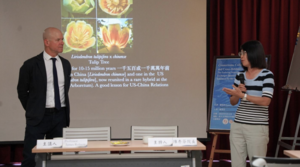
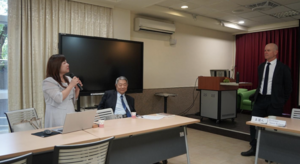
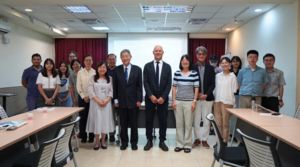
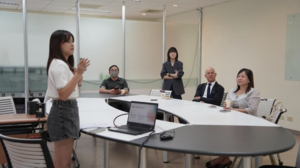

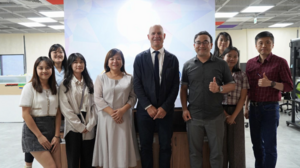
Date :
2025-09-17
Department :
Master’s Program in Global Communication and Innovation Technology
【Article by GCIT】
On September 12, 2025, the Master’s Program in Global Communication and Innovation Technology (GCIT) at National Chengchi University (NCCU) jointly hosted the World Excellence 100 Lecture Series with the Department of History and the College of Liberal Arts. Professor James Robson, Professor of East Asian Languages and Civilizations at Harvard University and Director of the Harvard-Yenching Institute (HYI), was invited to deliver a lecture at NCCU titled “Connections, Collaboration, and Cross-fertilization: The Enduring Importance of Cross-Cultural Exchanges Between Institutions of Higher Education for the Future of Asian Studies.”
Professor Robson traced the trajectory of academic exchanges between Harvard and East Asian higher education institutions, from the late 19th century to the present. He noted that since Chinese and Japanese students first began studying in the United States in the late 1800s, Harvard has gradually built lasting ties with East Asia. In 1928, Harvard and Yenching University jointly established the Harvard-Yenching Institute, fostering East-West research in academia. Entering the 21st century, HYI has expanded its collaborations with universities in Taiwan — including NTU, NTHU, and NCCU — and broadened its research scope from China and Japan to the Korean Peninsula, Southeast Asia, and South Asia.
“Even amid international political tensions, the exchange of academic ideas can eliminate information inequality, reduce misinformation, and by maintaining an open mind and curiosity toward international cross-cultural exchange, fear can be dispelled,” Professor Robson emphasized in his closing remarks.
After the event, Professor Robson joined NCCU Vice President Shu-Heng Chen, ICI Dean Wen-Ling Tu, and GCIT Director Trisha Lin for lunch, discussing opportunities for further academic collaboration between Harvard and NCCU as the latter approaches its centennial. Later, Professor Lin accompanied Robson on a tour of GCIT, where he interacted with faculty and students and explored the program’s innovative facilities, including its virtual studio.
GCIT student Hsin-Yu Tsai shared how she integrates her personal interests into coursework, describing a start-up project focused on Buddhist temples — a topic that resonated with Professor Robson’s ongoing research. Impressed by students’ creativity and GCIT’s forward-looking curriculum — particularly its overseas learning opportunities and generative AI content creation courses — Robson praised the program for embodying HYI’s original mission to serve as a bridge between Eastern and Western cultures. He expressed hope to return to NCCU and continue fostering academic and cultural exchange.
GCIT remains committed to strengthening its links with leading academic institutions worldwide, nurturing outstanding talents with global perspectives and cross-cultural communication skills.
[全球傳播與創新科技碩士學位學程亦獲文化部與教育部高等教育深耕計畫補助。]
On September 12, 2025, the Master’s Program in Global Communication and Innovation Technology (GCIT) at National Chengchi University (NCCU) jointly hosted the World Excellence 100 Lecture Series with the Department of History and the College of Liberal Arts. Professor James Robson, Professor of East Asian Languages and Civilizations at Harvard University and Director of the Harvard-Yenching Institute (HYI), was invited to deliver a lecture at NCCU titled “Connections, Collaboration, and Cross-fertilization: The Enduring Importance of Cross-Cultural Exchanges Between Institutions of Higher Education for the Future of Asian Studies.”
Professor Robson traced the trajectory of academic exchanges between Harvard and East Asian higher education institutions, from the late 19th century to the present. He noted that since Chinese and Japanese students first began studying in the United States in the late 1800s, Harvard has gradually built lasting ties with East Asia. In 1928, Harvard and Yenching University jointly established the Harvard-Yenching Institute, fostering East-West research in academia. Entering the 21st century, HYI has expanded its collaborations with universities in Taiwan — including NTU, NTHU, and NCCU — and broadened its research scope from China and Japan to the Korean Peninsula, Southeast Asia, and South Asia.
“Even amid international political tensions, the exchange of academic ideas can eliminate information inequality, reduce misinformation, and by maintaining an open mind and curiosity toward international cross-cultural exchange, fear can be dispelled,” Professor Robson emphasized in his closing remarks.
After the event, Professor Robson joined NCCU Vice President Shu-Heng Chen, ICI Dean Wen-Ling Tu, and GCIT Director Trisha Lin for lunch, discussing opportunities for further academic collaboration between Harvard and NCCU as the latter approaches its centennial. Later, Professor Lin accompanied Robson on a tour of GCIT, where he interacted with faculty and students and explored the program’s innovative facilities, including its virtual studio.
GCIT student Hsin-Yu Tsai shared how she integrates her personal interests into coursework, describing a start-up project focused on Buddhist temples — a topic that resonated with Professor Robson’s ongoing research. Impressed by students’ creativity and GCIT’s forward-looking curriculum — particularly its overseas learning opportunities and generative AI content creation courses — Robson praised the program for embodying HYI’s original mission to serve as a bridge between Eastern and Western cultures. He expressed hope to return to NCCU and continue fostering academic and cultural exchange.
GCIT remains committed to strengthening its links with leading academic institutions worldwide, nurturing outstanding talents with global perspectives and cross-cultural communication skills.
[全球傳播與創新科技碩士學位學程亦獲文化部與教育部高等教育深耕計畫補助。]
